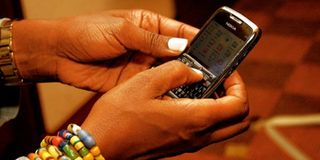US scientists ‘spied’ on phone users

An American university and a Kenyan research agency obtained private cell phone details of nearly 15 million Kenyans in 2008 without their knowledge, the university now says. Photo/FILE
What you need to know:
- By the end of 2008, Kenya had just over 15 million mobile phone subscribers, according to official data from the Communication Commission of Kenya (CCK).
- Consumer Federation of Kenya secretary general Stephen Mutoro termed the move as illegal, saying they had written a protest letter to local mobile phone companies.
- On social media, Kenyans reacted angrily to the revelations. Joan Onyango-Obunga posted, “We are under surveillance of whatever sort 24/7 ... It has become the norm.” Donald J Ouko wondered, “Why track 15M Kenyans under the guise of monitoring malaria? Why did a local provider unilaterally open its data base for use by foreigners?” Faith Anne termed it a lack of ethics in research.
An American university and a Kenyan research agency obtained private cell phone details of nearly 15 million Kenyans in 2008 without their knowledge, the university now says.
Researchers at the Harvard School of Public Health (HSPH) and the Kenya Medical Research Institute (Kemri) used the data to conduct a survey on how malaria spreads in the Kenya.
A statement posted on the university’s website says, between June 2008 and June 2009, the researchers mapped every call or text made by each of 14,816,521 Kenyan mobile phone subscribers to one of 11,920 cell towers located in 692 different settlements.
“Every time an individual left his or her primary settlement, the destination and duration of each journey was calculated,” adds the statement.
Then, using a 2009 malaria prevalence map provided by co-authors at Kemri and the Malaria Atlas Project to estimate the disease’s prevalence in each location being studied, they inferred each resident’s probability of being infected and the daily probability that visitors to particular areas would become infected.
By the end of 2008, Kenya had just over 15 million mobile phone subscribers, according to official data from the Communication Commission of Kenya (CCK).
This implies that the researchers tracked the movements of more than 98 per cent of Kenyans who had mobile phones at the time.
“This is the first time that such a massive amount of cell phone data—from millions of individuals over the course of a year—has been used, together with detailed infectious disease data, to measure human mobility and understand how a disease is spreading,” said senior author Caroline Buckee, HSPH assistant professor of epidemiology.
The US National Institutes of Health (NIH) Models of Infectious Disease Agent Study program, the National Science Foundation Graduate Research Fellowship program (#0750271), the Bill and Melinda Gates Foundation, and the Wellcome Trust, supported the project.
The survey, which was published in the October 12, 2012 issue of the journal Science, indicated that malaria, in large part,, emanates from Kenya’s Lake Victoria region and moves towards the capital, Nairobi.
But Kenyans will be incensed to find that their mobile phone data was accessed without their prior permission or knowledge.
Consumer Federation of Kenya secretary general Stephen Mutoro termed the move as illegal, saying they had written a protest letter to local mobile phone companies.
“What’s more disturbing is that a foreign agency was involved in the study,” he protested.
The Cofek boss said, the issue raises legitimate concerns about the safety of mobile phone users.
On social media, Kenyans reacted angrily to the revelations. Joan Onyango-Obunga posted, “We are under surveillance of whatever sort 24/7 ... It has become the norm.” Donald J Ouko wondered, “Why track 15M Kenyans under the guise of monitoring malaria? Why did a local provider unilaterally open its data base for use by foreigners?” Faith Anne termed it a lack of ethics in research.
In June, the US government was left with egg on face following revelations that it has been obtaining mobile phone details of innumerable users across the globe.
Mr Mutoro accuses telecom companies of breaching confidentiality agreement, which bars them from giving out others people’s details to third parties without the owners’ consent.
Enquiries to Harvard on how they obtained the data have not been answered. Neither CCK and nor Kemri officials could be reached for comment.




